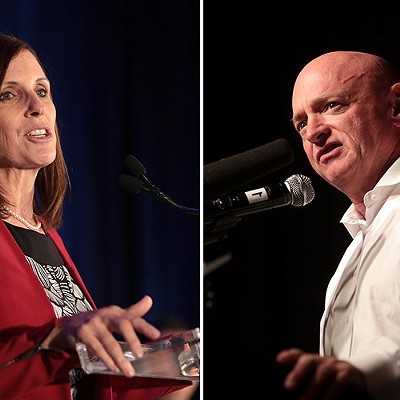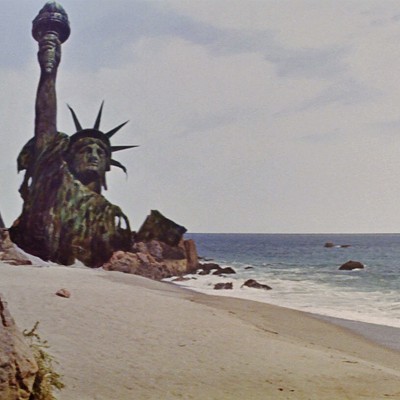Geoffrey Gonsher, director of the Arizona Department of Racing, ordered Favreau to pay $140,000--or $1,000 per dog--to a greyhound-adoption program. The Dec. 19 ruling also instructed Favreau to contribute 700 hours of community service to an adoption or animal-rights group, revoked his license and barred him from obtaining a new license in Arizona for the rest of his life. Favreau has 30 days from the date of the ruling to appeal.
Tucson Greyhound Park reportedly paid Favreau $150 a head to transport hounds to his facility in Calhan, Colo., and then distribute them to adoption groups between November 2005 and July 2006. The vast majority of the dogs disappeared after they left the track, however. (See "Dogs Gone," Nov. 9.)
Gonsher wrote in the ruling that "the worst fear is that the animals were heartlessly put to death ... and are now in an undisclosed graveyard in the desert.
"This entire scenario smells of foul play and is revolting to those who love greyhounds, both as pets and as athletes, fully support humane treatment of animal athletes and respect the legitimacy of pari-mutuel racing," the ruling continued.
In an earlier judgment, the Phoenix Greyhound Park Board of Stewards had suspended Favreau's license for 60 days and fined him $1,000, which went unpaid. The greyhound hauler followed through on a threat not to attend the Nov. 29 hearing presided over by Gonsher, which resulted in the Dec. 19 judgment.
Favreau has apparently disconnected the phone at his residence in Calhan. Earlier, he had complained to the Weekly he was being unfairly hounded by the media; indeed, journalists from all over the country--and some from outside the United States, according to greyhound activists--have run with the story. Favreau has repeatedly denied any wrongdoing, but has not provided any substantive information on the whereabouts of the dogs.
Susan Netboy, president of the California-based Greyhound Protection League, had mixed feelings about Favreau's punishment.
"I was shocked at the dollar amount he was fined," she said. "That's a huge fine for anyone to receive in the dog-racing industry. I was pleased with that, but I was dismayed about one thing, and that is that they didn't acknowledge the full number of dogs that were killed--even though they were working off the same records I was working off of."
Reports on how many animals went missing have varied, but Netboy believes as many as 37 additional greyhounds are unaccounted for in Gonsher's ruling. Gonsher told the Weekly that 140 was the number of dogs that could be verified at the time of Favreau's hearing, but there could be more.
Other greyhound activists expressed skepticism about the Arizona Department of Racing's ability to get Favreau to pay his fine.
"We are heartened by the findings against Favreau," wrote Mary Freeman, president of the Tucson-based Arizona Greyhound Rescue, in an e-mail. "Given the laws, there has been accountability. While the money can probably never be collected, the racing commission has given notice to others in the racing industry and Tucson Greyhound Park that willful disregard of greyhound welfare and negligence in recordkeeping will no longer be tolerated without serious consequences."
Similarly, Joan Eidinger, editor and publisher of Greyhound Network News, was impressed with the fine, but was unsure if it would ever be paid.
"My reaction is that it's unprecedented in the 60-year history of racing in Arizona. But I doubt if the state is ever going to collect it from him."
Gonsher said "yes and no" when asked if there were any mechanism for the department to force Favreau to pay. Because he had revoked Favreau's license, Gonsher said, his authority over the man was "very limited," but he added that he would be asking the collections unit of the Attorney General's Office to extract payment from the man.
"How successful they would be, I just don't know," he said.
Two messages left for Andrea M. Esquer, press secretary for the Attorney General's Office, weren't immediately returned.
Gonsher declined to comment on whether the Department of Racing will investigate TGP for its role in the disappearance. However, his order took note of the greyhound park's inability to produce records vital to finding out what happened to the dogs, adding that further review into the park's conduct may be warranted.
Chris McConnell, general manager at Tucson Greyhound Park, didn't return a message left for him at his office. TGP has typically refused to respond to media requests for comment on the Favreau affair.
Netboy and others would like to see TGP's actions--or inactions--in the greyhounds' disappearance exposed.
"It's high time that Tucson Greyhound Park pays a price for (its) role in being negligent about any concern as to who was hauling off these dogs," Netboy said.
Eidinger agreed. "I think there's a bigger question here, and that's the fact that the director wants the Phoenix Board of Stewards to look into the role of the track. The track has to be looked at. It's not just one guy: They hired him; they paid him; they knew from the NGA (National Greyhound Association) that he had his license suspended for donating dogs to research labs. So they knew that he was not a great guy."












